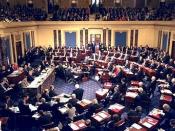Should it be illegal to publish literature with "indecent" content on the Internet but perfectly legal to publish that same work in print? This question has spawned the debate over Internet censorship, which is currently raging in the United States Congress as well as in other political forums around the world. The question as to whether the Internet should be censored will continue to be debated for many years to come. As with any political topic, the debate over Internet censorship has its extremes. Many proponents of Internet censorship want strict control over this new information medium. Proponents of Internet censorship such as Senator Jim Exon (D-NE), co-author of the Communications Decency Act (CDA), are in favor of putting strict laws into place regulating the Internet in order to protect children: "The Decency Act stands for the premise that it is wrong to provide pornography to children on computers just as it is wrong to do it on a street corner or anywhere else" (Exon).
These proponents suggest creating laws for the Internet similar to those now in place for television and radio. Those strongly opposing Internet regulations, such as the Citizens Internet Empowerment Coalition (CIEC), assert that the Internet is not like a television and should not be regulated like one. Both sides base their respective arguments on how they view the new information medium. Though the laws that Congress are proposing to regulate the Internet are well intentioned, I strongly believe that the Internet should not be censored because any law encroaching on the people's right to free speech is a obvious breach of First Amendment rights and because laws limiting Internet speech are too broad and unenforceable on this global medium.
To understand why legislators are attempting to censor the Internet despite the fact that it is...



Thank you
This was a very well written essay. It helped me out for my class alot. Thank you
0 out of 0 people found this comment useful.